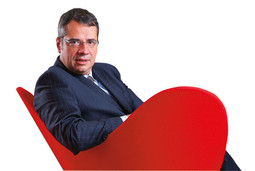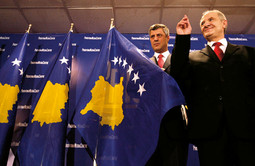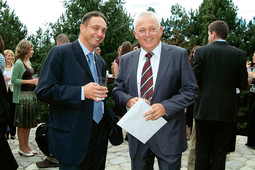Published in Nacional number 657, 2008-06-16
A new investment oasis
Croatians on the hunt for Kosovo millions
At a July donator\'s conference Kosovo is to get at least a billion euro in assistance for infrastructure work, a part of which will be carried out by some of the 80 Croatian companies present in that country
 The commercial and residential complex in downtown Pristina, whose construction is to be led by Konstruktor of Split, will be, at 42 floors, the tallest building in the Balkans The Split-based construction firm Konstruktor recently won a tender to build a large commercial and residential complex in the heart of Pristina. It will be the highest skyscraper in the Balkans, with 42 floors and standing 165 metres tall. The structure will have a floor space of 350 thousand square metres, and the total value of the project is 250 million euro. When completed, the building to be built by Konstruktor will feature a hundred luxury apartments, a business tower, shopping centre, hotel and a garage with six underground levels. The investor, the Kosovo firm ENK Invest Group, awarded the job to Konstruktor after a public tender.
The commercial and residential complex in downtown Pristina, whose construction is to be led by Konstruktor of Split, will be, at 42 floors, the tallest building in the Balkans The Split-based construction firm Konstruktor recently won a tender to build a large commercial and residential complex in the heart of Pristina. It will be the highest skyscraper in the Balkans, with 42 floors and standing 165 metres tall. The structure will have a floor space of 350 thousand square metres, and the total value of the project is 250 million euro. When completed, the building to be built by Konstruktor will feature a hundred luxury apartments, a business tower, shopping centre, hotel and a garage with six underground levels. The investor, the Kosovo firm ENK Invest Group, awarded the job to Konstruktor after a public tender.
As Zeljko Zderic, the president of the board at Konstruktor, says, Kontruktor's advantage is that there are not many companies in the region able to undertake a project of this complexity: "It is a large structure, whose construction presumes prerequisites that not everyone can meet. As the structure is to be very tall, and will also have a number of underground floors, there are few companies in the region with the manpower and technical potential needed. Konstruktor has all this, the people, the know-how and the technology, and that is why we won the tender. At the tender we faced some competition from some Greek firms, but our offer and our references proved to be the better ones. We will engage domestic producers in the construction, but will use our own resources for the most part."
 THE INVESTOR into the commercial and residential complex in Pristina, the Kosovo firm of ENK Invest, awarded the construction to Konstruktor after a public tender At Konstruktor they hope that this job will be only the beginning of their operations in Kosovo. The skyscraper that is to be built, namely, is only the first in a series of projects to build large-scale and modern complexes in the heart of Pristina. The building should serve as a reference for Konstruktor, and for other Croatian construction companies in Kosovo over the coming years in expectation of a significant investment cycle, especially in the construction of roadway infrastructure.
THE INVESTOR into the commercial and residential complex in Pristina, the Kosovo firm of ENK Invest, awarded the construction to Konstruktor after a public tender At Konstruktor they hope that this job will be only the beginning of their operations in Kosovo. The skyscraper that is to be built, namely, is only the first in a series of projects to build large-scale and modern complexes in the heart of Pristina. The building should serve as a reference for Konstruktor, and for other Croatian construction companies in Kosovo over the coming years in expectation of a significant investment cycle, especially in the construction of roadway infrastructure.
A large donator's conference is to be held in Brussels on 9 July. Top Kosovo officials will be there seeking 1.6 billion euro in assistance from foreign donators, and at least a billion euro is expected to be donated. Kosovo Prime Minister Hashim Thaci has already ordered local officials to draft detailed plans and projects for their regions.
Croatian construction firms see an opportunity here, and some of them, such as the Viaduct company, have already opened their offices in Kosovo and have stated preparing for construction project tenders. Many Croatian companies, on the other hand, already do good business in Kosovo. There are over 80 Croatian companies present in the country, and among these the biggest jobs were carried out by construction firms and by Ericcson Nikola Tesla. As far back as in 2002 Zagreb-based Ingra carried out construction work on the expansion and reconstruction of the airport in Pristina.
 Sasa Romac, a member of the management board at Podravka, a company that leads a field of Croatian food companies in Kosovo The Croatian Civil Engineering Institute (IGH) is also active on the Kosovo market. That company first won a tender to do the design work for the construction of 60 kilometres of highway from Pristina and Urosevac in Kosovo. The project is being financed by the European Investment Bank, and Jure Radic, the top man at IGH, has announced the start of talks on the opening of a construction institute in Kosovo, as he feels that there will be plenty of work there for construction firms over the coming years. It is presumed that the IGH will set up the institute in collaboration with local partners as it has done in other countries in the region.
Sasa Romac, a member of the management board at Podravka, a company that leads a field of Croatian food companies in Kosovo The Croatian Civil Engineering Institute (IGH) is also active on the Kosovo market. That company first won a tender to do the design work for the construction of 60 kilometres of highway from Pristina and Urosevac in Kosovo. The project is being financed by the European Investment Bank, and Jure Radic, the top man at IGH, has announced the start of talks on the opening of a construction institute in Kosovo, as he feels that there will be plenty of work there for construction firms over the coming years. It is presumed that the IGH will set up the institute in collaboration with local partners as it has done in other countries in the region.
Zeljko Zderic explains the high level of activity of Croatian construction companies in Kosovo with the fact that Croatian companies have some comparative advantages there over the international competition: "The relations between Croatia and Kosovo are good, and among the people of Kosovo there is a great deal of sympathy towards Croatia and our companies. On the other hand we should not forget that we lived for many years in the same state, so that Croatian companies, Croatian products, and even some individuals, have high standing references there. That is why Croatian business people should capitalise on this opportunity and start doing business in Kosovo as soon as possible."
 Ivan Misetic, the director of Croatia Airlines, opened the company's first commercial flight from Zagreb to Pristina That is something Ilirjana Shehu, the head of the Croatian Chamber of Economy's office in Kosovo, agree with. Since coming into the post in 2000 Ilirjana Shehu has promoted the interests of Croatian companies in Kosovo. It was she who recommended Konstruktor to the investors as the contractor of the Pristina skyscraper. She says that Kosovo offers big opportunities for Croatian companies: "Imports from Croatia to Kosovo in 2007 amounted to 38 million euro. Croatian companies carried out some large jobs there, especially Konstruktor and Ericsson Nikola Tesla, which in the space of six months set up a new mobile telephony network. That project alone was worth 38 million euro. I think that these are positive examples that are indicative of the kind of potential that exists in Kosovo. Croatia and Kosovo have long historical ties, many emigrants from Kosovo live in Croatia, and these are all reasons why Croatian products are well-accepted in Kosovo, even when they are higher priced than a competitor's product." The recognisability of Croatian products is certainly one of the reasons why, along with insurer Croatia Insurance, the best business results in Kosovo to date have been those of Croatian food companies and tobacco producer Tvornica duhana Rovinj. Podravka and Ledo export significant quantities of their products to the Kosovo market. Ledo, for example, has much better results in Kosovo that in Macedonia, a nominally larger market. That company owns over 3 thousand iceboxes in Kosovo, and has invested significant funds in building a large refrigeration facility in Malisevo.
Ivan Misetic, the director of Croatia Airlines, opened the company's first commercial flight from Zagreb to Pristina That is something Ilirjana Shehu, the head of the Croatian Chamber of Economy's office in Kosovo, agree with. Since coming into the post in 2000 Ilirjana Shehu has promoted the interests of Croatian companies in Kosovo. It was she who recommended Konstruktor to the investors as the contractor of the Pristina skyscraper. She says that Kosovo offers big opportunities for Croatian companies: "Imports from Croatia to Kosovo in 2007 amounted to 38 million euro. Croatian companies carried out some large jobs there, especially Konstruktor and Ericsson Nikola Tesla, which in the space of six months set up a new mobile telephony network. That project alone was worth 38 million euro. I think that these are positive examples that are indicative of the kind of potential that exists in Kosovo. Croatia and Kosovo have long historical ties, many emigrants from Kosovo live in Croatia, and these are all reasons why Croatian products are well-accepted in Kosovo, even when they are higher priced than a competitor's product." The recognisability of Croatian products is certainly one of the reasons why, along with insurer Croatia Insurance, the best business results in Kosovo to date have been those of Croatian food companies and tobacco producer Tvornica duhana Rovinj. Podravka and Ledo export significant quantities of their products to the Kosovo market. Ledo, for example, has much better results in Kosovo that in Macedonia, a nominally larger market. That company owns over 3 thousand iceboxes in Kosovo, and has invested significant funds in building a large refrigeration facility in Malisevo.
 Željko Žderić i Jure Radić In the past large Croatian companies were quite restrained in their operations in Kosovo, fearing that the move could create problems with the operations in Serbia, a much larger and more developed market. Previously the Kosovo Chamber of Commerce had written a letter of invitation to Ivica Todoric and his Agrokor company to start doing business and to invest on a larger scale in Kosovo. With the exception of Ledo, Agrokor has not to date demonstrated interest for doing business in Kosovo, and many feel that that is a consequence of Todoric's fears that it might threaten his investments in Serbia. It appears, however, that these fears have been overcome.
Željko Žderić i Jure Radić In the past large Croatian companies were quite restrained in their operations in Kosovo, fearing that the move could create problems with the operations in Serbia, a much larger and more developed market. Previously the Kosovo Chamber of Commerce had written a letter of invitation to Ivica Todoric and his Agrokor company to start doing business and to invest on a larger scale in Kosovo. With the exception of Ledo, Agrokor has not to date demonstrated interest for doing business in Kosovo, and many feel that that is a consequence of Todoric's fears that it might threaten his investments in Serbia. It appears, however, that these fears have been overcome.
There are a lot of companies doing business in Kosovo that earn a significant portion of their earnings in Serbia, such as the Pastor group. Last year that firm had over five million euro in earnings there, regardless of the fact that it also did business in Kosovo. That is proof that fears Croatian business people have that doing business in Kosovo could hurt their operations in Serbia are unjustified. Moreover, some Croatian companies has recognised in Kosovo the means to gain access to the much more attractive Albanian market.
 Gordana Kovacevic, who heads Ericsson Nikola Tesla, put a 38 million euro GSM network into operation A new boost to the development of economic relations between Croatia and Kosovo will be the introduction of regular flights between Zagreb and Pristina. Croatia Airlines flights will, as of this week make three scheduled flights a week, Mondays, Wednesdays and Fridays, between the Croatian and Kosovar capital. This is a long-expected move on the part of Croatia Airlines, given that some airline companies such as Adria Airways and Austrian Airlines have long had direct flights to Pristina on their schedule and are recording excellent turnover on them. Adria Airways has flown to Pristina since 1999 and has an average occupancy rate of 62 percent on the line.
Gordana Kovacevic, who heads Ericsson Nikola Tesla, put a 38 million euro GSM network into operation A new boost to the development of economic relations between Croatia and Kosovo will be the introduction of regular flights between Zagreb and Pristina. Croatia Airlines flights will, as of this week make three scheduled flights a week, Mondays, Wednesdays and Fridays, between the Croatian and Kosovar capital. This is a long-expected move on the part of Croatia Airlines, given that some airline companies such as Adria Airways and Austrian Airlines have long had direct flights to Pristina on their schedule and are recording excellent turnover on them. Adria Airways has flown to Pristina since 1999 and has an average occupancy rate of 62 percent on the line.
The Croatian firm long declined to set up a direct flight to Pristina, regardless of the fact that a large number of Kosovo emigrants in Croatia would almost certainly make the undertaking a profitable one. The reasons were manifold, from the unstable political situation in Kosovo, to the desire of Croatia's national administration, majority owner of Croatia Airlines, to not worsen its bilateral relations with Serbia by the move. Nevertheless, after Croatia's official recognition of Kosovo independence the political conditions have been set for the Croatian air carrier to finally move forward with the job.
 THE LEADERS OF KOSOVO Prime Minister Hashim Thaçi and President Fatmir Sejdiu But, on the other hand, Ilirjana Shehu points out that Croatian companies have so far been very uninterested in making direct investments in Kosovo, even thought the privatisation of Kosovo's state-owned property is being carried out in a very transparent fashion under the supervision of international organisations. She does expect, however, for the level of interest in this to also grow in the coming period: "So far there has been very little direct investment. It is not the problem only of Croatia, but also of some other countries. Few were ready to invest in Kosovo in a situation in which the political environment was unstable. After the proclamation of independence the situation has changed. After the international investor's conference the Government of Kosovo plans to offer foreigners investment into two sectors, energy and infrastructure. I think that a lot of space that will open here for Croatian firms. It should also not be forgotten that Kosovo is the youngest nation in Europe, that is to say that there is an abundant labour market, that taxes are low and that the government is preparing a tax reform."
THE LEADERS OF KOSOVO Prime Minister Hashim Thaçi and President Fatmir Sejdiu But, on the other hand, Ilirjana Shehu points out that Croatian companies have so far been very uninterested in making direct investments in Kosovo, even thought the privatisation of Kosovo's state-owned property is being carried out in a very transparent fashion under the supervision of international organisations. She does expect, however, for the level of interest in this to also grow in the coming period: "So far there has been very little direct investment. It is not the problem only of Croatia, but also of some other countries. Few were ready to invest in Kosovo in a situation in which the political environment was unstable. After the proclamation of independence the situation has changed. After the international investor's conference the Government of Kosovo plans to offer foreigners investment into two sectors, energy and infrastructure. I think that a lot of space that will open here for Croatian firms. It should also not be forgotten that Kosovo is the youngest nation in Europe, that is to say that there is an abundant labour market, that taxes are low and that the government is preparing a tax reform."
 The young population is in fact the resource that Kosovo politicians are basing the future development of the country on. Of the 2 million inhabitants of Kosovo, 60 percent are aged under 35. The problem is that as much as 52 percent of the population is unemployed, and those that do work earn very little. The average wage in the private sector comes to only 220 euro a month, while those who work in the civil service earn even less – just over 160 euro on the average. The economy is undeveloped and exceedingly oriented to imports. Kosovo imports nine times more than it exports.
The young population is in fact the resource that Kosovo politicians are basing the future development of the country on. Of the 2 million inhabitants of Kosovo, 60 percent are aged under 35. The problem is that as much as 52 percent of the population is unemployed, and those that do work earn very little. The average wage in the private sector comes to only 220 euro a month, while those who work in the civil service earn even less – just over 160 euro on the average. The economy is undeveloped and exceedingly oriented to imports. Kosovo imports nine times more than it exports.
 Igor Oppenheim, director of Ingra, a company that as early as in 2002 worked on the expansion of the Pristina airport and Tomislav Dragicevic, who did well in seeing the large Bardos oil storage facility near Pristina reinstated to INA If it wants to reduce unemployment the Kosovar government will also have to work on educating the population considering that currently as much as 46 percent of the population has only basic qualifications or is unskilled. Nevertheless, even in these conditions, Kosovo became very interesting to foreign investors after its declaration of independence. Leading the field are Austrian, Turkish and Slovene companies who have started collaborating with Kosovar entrepreneurs. The bureaucracy was also a significant obstacle to doing business in Kosovo. And while the authorities there have taken some steps to simplify doing business there, investor's continue to meet with significant difficulties. It still requires over 20 days and five different legal procedures to incorporate a company. In that kind of situation setting up a safe business environment is crucial to the operations of Croatian companies in Kosovo. One of the ways that can be effected is for Croatian financial institutions to also enter the local market. Companies from western European countries operating in Croatia in a similar fashion in the 1990s. First came the banks, to which insurance firms were linked, and together they provided the companies with support. Croatian companies have an opportunity to do the same in Kosovo, and the first step was taken in that direction by insurer Croatia Insurance who has been doing business there for two years now. Since 2005 that company has made significant progress in Kosovo. They have tripled there gross profits which last year came to a little over 2 million kuna. And while that is not a significant amount for Croatia Insurance, they are aware at that company that the most important thing over the coming years is to secure an as large as possible market share, and as earnings and profits grow, so will the Kosovo economy develop and the standard of living of Kosovars improve. As Ivan Zigic, director of corporate communication at Croatia Insurance says, doing business in Kosovo is an important part of the company's business strategy. "It is our goal to operate successfully on all of the markets of the former Yugoslavia, including in Kosovo. We have been there for two years now and are satisfied with the results, and have won some large clients such as Pristina Airport. I believe that our business strategy will be even more successful as Kosovo begins to develop and as the standard of living of improves."
Igor Oppenheim, director of Ingra, a company that as early as in 2002 worked on the expansion of the Pristina airport and Tomislav Dragicevic, who did well in seeing the large Bardos oil storage facility near Pristina reinstated to INA If it wants to reduce unemployment the Kosovar government will also have to work on educating the population considering that currently as much as 46 percent of the population has only basic qualifications or is unskilled. Nevertheless, even in these conditions, Kosovo became very interesting to foreign investors after its declaration of independence. Leading the field are Austrian, Turkish and Slovene companies who have started collaborating with Kosovar entrepreneurs. The bureaucracy was also a significant obstacle to doing business in Kosovo. And while the authorities there have taken some steps to simplify doing business there, investor's continue to meet with significant difficulties. It still requires over 20 days and five different legal procedures to incorporate a company. In that kind of situation setting up a safe business environment is crucial to the operations of Croatian companies in Kosovo. One of the ways that can be effected is for Croatian financial institutions to also enter the local market. Companies from western European countries operating in Croatia in a similar fashion in the 1990s. First came the banks, to which insurance firms were linked, and together they provided the companies with support. Croatian companies have an opportunity to do the same in Kosovo, and the first step was taken in that direction by insurer Croatia Insurance who has been doing business there for two years now. Since 2005 that company has made significant progress in Kosovo. They have tripled there gross profits which last year came to a little over 2 million kuna. And while that is not a significant amount for Croatia Insurance, they are aware at that company that the most important thing over the coming years is to secure an as large as possible market share, and as earnings and profits grow, so will the Kosovo economy develop and the standard of living of Kosovars improve. As Ivan Zigic, director of corporate communication at Croatia Insurance says, doing business in Kosovo is an important part of the company's business strategy. "It is our goal to operate successfully on all of the markets of the former Yugoslavia, including in Kosovo. We have been there for two years now and are satisfied with the results, and have won some large clients such as Pristina Airport. I believe that our business strategy will be even more successful as Kosovo begins to develop and as the standard of living of improves."
If Croatia Insurance was joined on the Kosovo market by one of the Croatian banks the financial conglomerate would be capable of insuring a safe business environment for Croatian firms. It is felt that the most favourable situation would involve Croatian Postal Bank as it, like Croatia Insurance, is in majority state ownership.
Kosovo in numbersPopulation: 2,126,708
Age structure: 60 percent under 35 years of age
Education: 46% of the population has only basic qualifications
Unemployment: 43 percent
GDP per capita: 1,800 USD
Exports: 148 million USD
Average monthly wage: 220 euro
Related articles
Merger of HPB and Croatia osiguranje
Nacional has learned from a senior Government source that Damir Polancec, Deputy Prime Minister and Minister of the Economy, is the very likely… Više
Latest news
-
28.10.2010. / 14:15
'A profitable INA is in everyone's interest'
-
28.10.2010. / 09:38
Sanader’s eight fear SDP — Won’t bring down Government
-
21.10.2010. / 15:02
Interior Ministry turned a blind eye on Pukanic assassination
-
20.10.2010. / 09:34
Barisic could bankrupt HDZ




